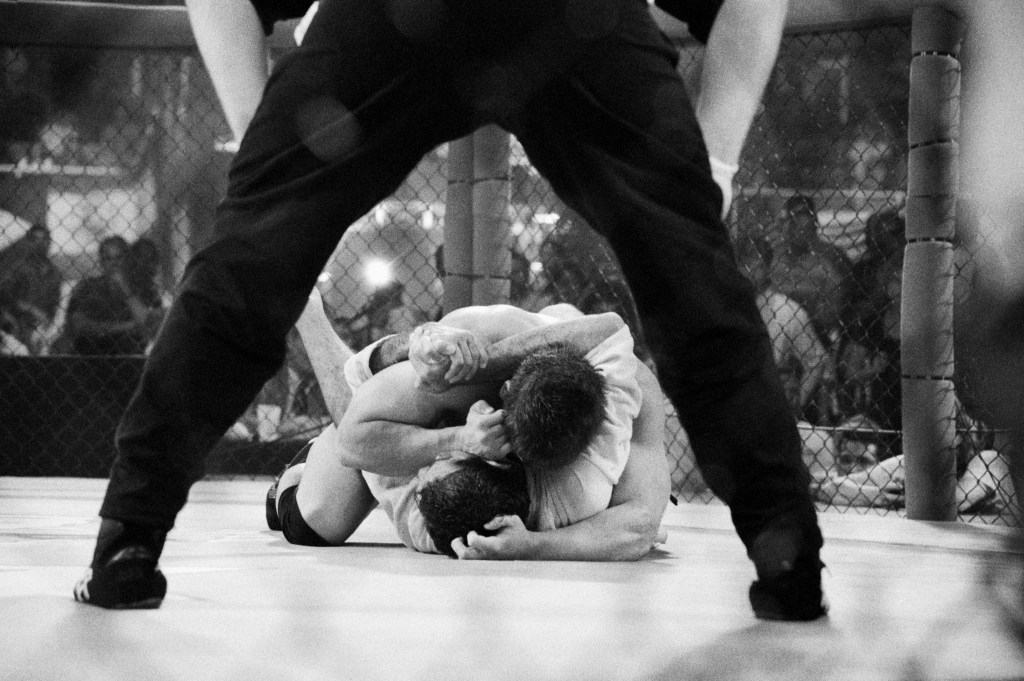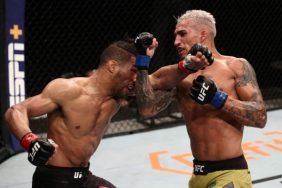Photo: Evan Hurd/Sygma (Getty)
These days, the Ultimate Fighting Championship — or UFC, as it is more commonly known — is synonymous with the sport of mixed martial arts. In fact, many casual observers believe that the UFC and MMA are one and the same.
While that isn’t exactly correct, the UFC is generally regarded as the first and foremost organization in the cagefighting world today. It wasn’t always that way, however. Several key events helped spark the growth of the UFC into the powerful entity it is now. Here is everything you need to know about the UFC.
Its first event was created to settle a simple argument: Who is the best at fighting?
At its inception, the UFC’s main goal was to determine which style of combat — including disciplines such as boxing, kickboxing, Brazilian jiu-jitsu, wrestling, karate, judo and sambo, to name a few — would prove superior in a cage fight. An eight-man, one-night tournament was created by Art Davie and Rorion Gracie in 1993 to find out exactly that. Other than biting and eye gouging, everything was fair game. That night at the McNichols Sports Arena in Denver saw Royce Gracie introduce the world to the art of jiu-jitsu, as he submitted three men to win the bracket and a $50,000 prize. Gracie went on to become one of the sport’s greatest influences, winning three of the first four events, and was later elected to the UFC Hall of Fame.
The UFC was not universally accepted in its early years
United States Senator John McCain famously referred to MMA as “human cockfighting” in 1996, which led to 36 states banning the UFC. As a result, the promotion began to gradually implement more palatable provisions, such as weight classes and fighter gloves. No change was more significant than the adoption of the Unified Rules of Mixed Martial Arts, which was initially adopted by the New Jersey State Athletic Control Board in 2000. A clear rule set and a willingness to work with various state athletic commissions led to the UFC being sanctioned across the country. The first sanctioned event, UFC 28, officially took place in New Jersey on Nov. 17, 2000.
Zuffa’s purchase of the UFC turned out to be a game changer
In January 2001, prominent Las Vegas casino owners Lorenzo and Frank Fertitta purchased the UFC from Semaphore Entertainment Group (SEG) for a measly $2 million at the urging of childhood friend Dana White. With, that White was appointed as UFC president and Zuffa, LLC – the UFC’s parent company — was formed. Much of the UFC’s current presentation, from its pay-per-views to its promotion of fighters to its overall branding, can be attributed to Zuffa’s influence and love for mixed martial arts. The Fertittas finally sold the UFC to WME-IMG in 2016 for a reported $4.2 billion, so it’s safe to say they got a decent return on their investment.
A reality show launched the UFC into mainstream prominence
While the UFC certainly had its moments in the early years of the Zuffa era, perhaps nothing did more for the promotion than the introduction of “The Ultimate Fighter” reality show. The premise was relatively simple: Put a group of fighters in a house for several weeks and have them battle it out to see who earns a six-figure UFC contract. No one could have imagined that the wildly entertaining fight on Spike TV between Forrest Griffin and Stephan Bonnar at finale of that first season would help make the UFC and MMA, as it would be called for the next several years, “the world’s fastest growing sport.” At that point, UFC became an event where you called your friends and told them to “Turn on the fight.”
It made its way onto network TV in 2011
In the sports world, nothing signals “you made it” more than a network TV deal. That finally arrived for the UFC in 2011, when it signed a seven-year agreement with Fox. The deal paid the UFC approximately $120 million per year over the course of the contract, and it exposed audiences on Fox, and later, Fox Sports 1, to the Las Vegas-based promotion’s brand of combat. Now, as the UFC’s deal with Fox comes to an end, the promotion could be looking for a new broadcasting partner, or partners. Years ago, the idea that a renegade company would have gotten to such a prominent platform at all would have been difficult to fathom.









